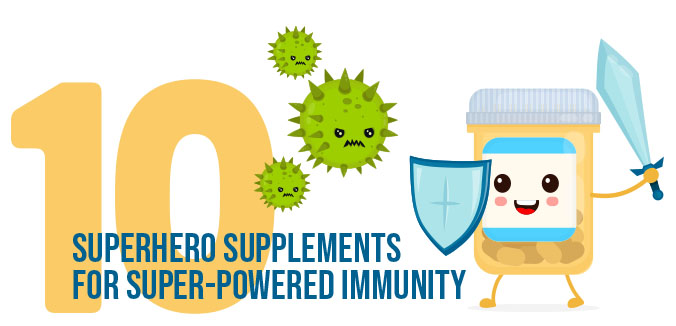


Sign-up for {N}power to get exclusive discounts, newsletters, members-only features, and more!

Your body’s immune system defends against all manner of infections. And like every other cell in your body, its individual constituents, from lymphocytes to natural killer cells, depend on nutrition for optimal functioning. The best plan of action is to take steps early on to enhance your immunity. The majority of the supplements in this article (elderberry is the exception) should be taken regularly to support the healthy functioning of your immune system. This doesn’t mean that you won’t get sick, but a healthy, competent immune system is more resilient and better able to handle an infection, lessening symptoms, duration, and severity.

Vitamin C is a key player in immunity, and it is required by a number of critical immune cells, including white blood cells and natural killer cells, to function properly. It has an impact on both innate and acquired immune responses against infection. Because the human body cannot make vitamin C and this important antioxidant is severely depleted by inflammation, stress, and illness, it is especially important to supplement during times of infection (it is also water soluble, meaning the body does not store it, so it has to be replenished daily). Additionally, vitamin C is similar in structure to glucose and uses the same receptor sites to enter the cell membrane—this means that if you eat a lot of sugars and simple carbs, less vitamin C will be absorbed because glucose is “hogging” the receptors sites. The key is to maintain optimal levels.
Take: 500-1,000 mg daily for maintenance. This may be increased up to 6,000 mg daily, in divided doses, during times of infection.
Vitamin D plays a central role in proper immune function and is required by our bodies to make a variety of germ-fighting factors, such as the important antimicrobial compound cathelicidin. It has also been shown to reduce the risk of viral infections, such as influenza, pneumonia related to viral infections, and acute respiratory tract infections. Researchers have noted that the winter and early-spring increase in viral infections appears directly related to less seasonal sun exposure and low vitamin D levels, and that those with low vitamin D levels tend to have more serious complications from viral infection like the flu.
Take: 5,000 IU daily for adults, and up to 1,200 IU daily for children.
Like vitamins C and D, this trace mineral is crucial for the proper functioning of the immune system and works synergistically with C and D to support both innate and adaptive immunity. These nutrients are actively used by immune cells to fight infections, including upper respiratory tract infections. Even moderate deficiencies in zinc can increase the risk of infection, and according to one review, “…impaired immune functions due to inadequate zinc status may be the most common cause of secondary immunodeficiency in humans.” Zinc influences the activity of important immune cells like macrophages, neutrophils, and natural killer cells, and also plays a role in immune cell messaging (i.e., it is required for certain immune cells to communicate). Zinc supplementation has been shown to reduce both the risk and duration of pneumonia in children and the elderly, as well as reducing the incidence of infections like the common cold and flu.
Take: 30 mg daily for long-term support. Increase to 50-75 mg daily during times of infection. Forms to consider include zinc acetate, gluconate, zinc orotate, and zinc citrate.
Selenium is a trace mineral that is important in maintaining healthy immunity. In people who are not severely selenium deficient, selenium supplementation has been shown to stimulate the immune response, including enhancing immune cell response to antigens. Other research indicates that selenium plays a role in regulating the expression of cytokines, cell-signaling molecules that play a crucial role in immune response. Selenium deficiency has been shown to impair the immune response, allowing viruses to freely replicate, and to increase a person’s susceptibility to viral infections.
Take: 100-200 mcg daily.
Take a B-complex daily to support general health, mental wellbeing, and overall immune function. B6, B1, and B12 are especially important for immune health. Low B6 intake has been associated with impaired immune function, including decreased production of lymphocytes (white blood cells and T-cells) and interleukin-2, which is crucial in the body’s response to infection. B1 (thiamin) supports healthy levels of inflammation, particularly during the early stages of the immune response (also known as innate immunity). This helps maintain a balanced immune response, which supports optimal functioning of the immune system. B12 is also important to immune function because it is necessary for proper cell division and growth, including that of white blood cells.
Take: A quality B-complex supplement will cover the bases, but for extra immune support, you may consider adding B6, B1, and B12 in addition to the B complex.

Elderberry (Sambucus nigra) can quickly reduce the aches, pains, and tired feeling that usually accompanies viral infections like the fl u. In one study, Israeli researchers found that 14 of 15 people taking elderberry extract had a signifi cant reduction in symptoms, including fever, after just two days, and 13 of the 15 patients were symptom free after three days. Other research has shown that elderberry has a direct anti-viral action. Most of the studies have used an elderberry syrup, not capsules.
Take: Follow label directions for use.
A large portion of our immune systems are located in our GI tracts, with mounting research indicating that a healthy gut microbiome plays an important role in defending the body against respiratory pathogens, while dysbiosis (an unhealthy imbalance in gut bacteria) can increase the risk of getting a respiratory tract infection. Research has shown that some specific types of probiotics can blunt the symptoms of viral infections in both children and adults: Bifidobacterium bifidum eased cold and fl u symptoms in stressed out college students and in a study of children in day care centers, Lactobacillus rhamnosus GG reduced upper respiratory tract symptoms. Still other research has shown that Bifidobacterium lactis and Lactobacillus brevis can improve cold and flu symptoms.
Take: What the label suggests. Any or all of the mentioned strains should provide preventive benefits when taken long term.
N-acetyl cysteine increases the body’s supply of glutathione, a powerful antioxidant that protects cells and supports the body’s normal detoxification processes. NAC is also used to break up mucous in the lungs. In one study, Italian researchers gave 262 seniors either 600 mg of NAC or placebos twice daily over the cold and fl u season. Of the people with laboratory-confirmed flu infections who were taking NAC, only 25 percent developed symptoms. In contrast, 79 percent of the men and women taking placeboes developed clear-cut fl u symptoms, according to an article in the European Respiratory Journal. NAC controlled the respiratory symptoms of the flu and, through its conversion to glutathione, boosted the body’s ability to manage infection
Take: 600 mg twice daily during the cold and flu season. On the first day of symptoms, increase the amount to 2,400 to 3,600 mg daily and continue until symptoms subside.
This flavonoid has been shown to have direct anti-viral action against multiple strains of the flu, in part by preventing the virus’ entry into cells and replication, specifically in the early stages of infection. One study found that the inhibitory effect of quercetin was enhanced when quercetin was already present in the body; in other words, it works most effectively when it’s taken before you get a viral infection. In addition to its anti-viral action, quercetin also supports a healthy inflammatory response by down regulating cytokine expression and secretion. In animal models, quercetin has been shown to reduce viral-induced inflammation, lung inflammation, improve lung function, and reduce the damaging effects of oxidative stress on the lungs.
Take: 1,000 mg daily, in divided doses.
Mushrooms have long been used in traditional medicine and modern science continues to prove their worth in human health. Along with promoting normal cell growth and supporting the body’s natural detoxification processes, mushrooms seem to also have an immune-boosting effect. One recent human study found that white button mushrooms increased the production of secretory immunoglobulin A (SIgA), by more than 50 percent. SIgA acts as the first line of defense against pathogens on mucosal surfaces (i.e. mouth, nose, lungs). Mushrooms are also rich in betaglucan, a naturally occurring branched polysaccharide that enhances immunity by activating white blood cells to engulf and destroy bacteria and viruses.
Take: A variety of mushroom extracts are available in supplement form; follow label instructions for doses.



Sign-up for {N}power to get exclusive discounts, newsletters, members-only features, and more!